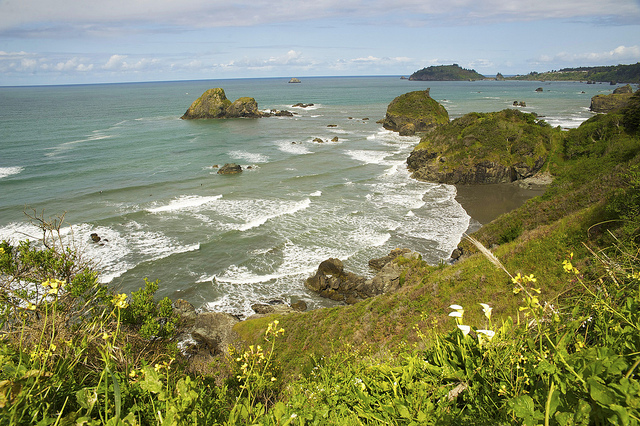
For more information or to register, contact Amber Ginther, HSU Marine Naturalist, at (707) 826-3689 or marnat@humboldt.edu. Registration forms are online at www.humboldt.edu/marinelab or at the HSU Marine Lab.
Program Schedule
DAY 1: The Marine Lab & Local History
This day begins with an introduction to the Marine lab as well as some local history. Kids will be taken on a tour of the lab, and can learn about some of the things that go on at the Marine Laboratory, and they will also learn about how the town of Trinidad began. We will be going on a hike to our local beaches and visiting Trinidad head.
DAY 2: The Ocean
Join us in discovering the chemical makeup of our ocean, and the properties that make water so unique. We will be testing many aspects of the water we find at our local beaches. We will learn all about the microscopic world that exists in the ocean such as the phytoplankton and zooplankton. Kids will then make their very own plankton nets, and we will travel to the beach to test them out.
DAY 3: Marine Mammals & Fish
Ever wondered what a cetacean or a pinniped is? What is the difference between a Killer Whale, a Sperm Whale, and a Blue Whale? Today is a great day to learn about some of the majestic mammals that grace our oceans. In addition, learn about the many fish that call our local water their home. Finally, we will be able to view some of these fish up close and personal, and the kids can even get an in depth look at a shark dissection.
DAY 4: Kelp Forest and Tide Pools
Join us as we learn about some of the magnificent animals that live in our local kelp forests and what we can do to help conserve and protect these amazing places. We will also learn about our local tide pools the stresses they face on a daily basis. At the end of the day kids will press their very own algae in a herbarium press that they can take home.
DAY 5: Classification & the Rocky Intertidal
Classification is an important tool that scientists use everyday as a way to organize all the animals one may encounter. This is a great skill to learn as the kids can apply it when we go on our very own tide pooling session at some of the local beaches.